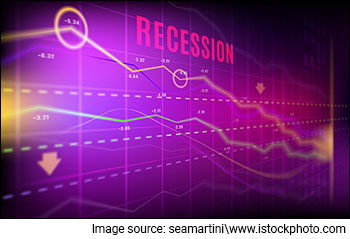India's Third Giant Leap
This Could be One of the Biggest Opportunities for Investors
- Home
- Views On News
- Oct 13, 2022 - How to Pick Recession Proof Stocks
How to Pick Recession Proof Stocks

In global financial markets these days, the word 'recession' is perhaps the most widely used. It's the talk of the town and Dalal Street is no different.
The Indian stock market is falling largely due to the fear of a global recession. Foreign investors are selling Indian stocks as well as stocks in all other emerging markets for the same reason.
This fear is very real and it seems to be taking on a life of its own. Investors worried about a recession are selling stocks in anticipation of one.
As more retail investors jump on this bandwagon there is growing concern the stock market could collapse back to June 2022 levels. That would bring the Nifty close to a bear market.
In this scenario, investors are on the look out for recession proof stocks.
Let's find out in this article...
What are recession proof stocks?
These are listed companies whose chare prices are not badly affected during a recession.
In a recession the economy contracts. GDP growth is negative. Businesses lose revenue and thus profits. Many businesses shut down. A significant percentage of the working population either lose their jobs, have to take a pay cut, or see their salaries stagnate.
In this situation, the stock market tends to fall. In some cases, as in 2008, the benchmark indices can fall by 50% or more. Individual stocks can fall even more.
This us why bear markets and recessions go hand in hand.
In a bear market, most stock prices decline. It's rare to see stocks going up in price or at least not falling during a bear market. So it should be no surprise that many of these stocks are called 'recession proof'.
In other words, these are stocks of companies that are not badly affected by the recession.
Which stocks are recession proof?
There is no definition of recession proof stocks or recession proof businesses.
But they are not hard to identify. Usually recession proof stocks are found in specific sectors.
These sectors do not see a big fall in demand in a recession. This is because their produces and services tend to be 'sticky' i.e. people and businesses have to buy them even during a recession.
Broadly, these sectors are...
- Healthcare
- Consumer staples/FMCG
- Utilities
- Discount retailers
- Agriculture
Healthcare and pharma stocks are typically recession proof because people have to buy medicines or visit hospitals if they get sick. The state of the economy is not a consideration.
Consumer staples are everyday necessities. Think about all the stuff you buy when you visit your neighbourhood grocery store or when you place orders on Swiggy, Zepto or Big Bazaar.
These products will always be in demand. Thus, the revenue of the companies producing them will remain stable even in a recession.
These companies belong to the FMCG sector but be aware that not all FMCG companies are recession proof. For example, if a company's main product is priced more than its competitors, then it may be impacted in a recession as customers downgrade to a cheaper product.
Utilities are companies that provide essential services like electricity, water, gas, and telecom. Their businesses are not impacted too much in a recession.
Discount retailers tend to do well in recessions. This is because people reduce their spending by looking for cheaper options. Thus, during a recession, they tend to make purchases at discount retailers almost by default.
Agri stocks are also resilient during recessions as rural India is less severely impacted than urban India in an economic downturn. As the incomes of rural India are closely tied to agriculture, the companies in this sector (makers of fertilizers, seeds, pesticides, etc) won't be badly impacted.
Other options for investors
In the Indian context there are other categories of stocks which can do well in a recession but there are a lot of caveats in these cases. Investors should be extra cautious with these stocks.
PSU stocks can be the beneficiaries of higher government spending during a recession. This is because governments increase spending on infrastructure and social projects in an economic downturn. This spending is sometimes channelled through PSUs.
The defense sector is also relatively unaffected by recessions. This is because the government rarely reduces the annual spending on defence. However the rate of increase in the annual defense budget may be affected in a recession if the government expects a big fall in tax revenue.
An important thumb rule
As an investor, you should be focused on buying the most fundamentally strong stocks for the long term. This is true in both good times and bad.
In a recession, the fundamentally strongest companies in every sector will emerge stronger. Once the dust settles, many of their weaker competitors will be either out of business or may be willing to be acquired.
Thus, it's a good practice to look for the industry leaders in every sector. These stocks will be the most resilient during a recession. They may fall along with the rest of the market but they are also the most likely to rise again strongly when the market turns back up.
These are the most likely candidates to become multibagger stocks in India.


Equitymaster requests your view! Post a comment on "How to Pick Recession Proof Stocks". Click here!
Comments are moderated by Equitymaster, in accordance with the Terms of Use, and may not appear
on this article until they have been reviewed and deemed appropriate for posting.
In the meantime, you may want to share this article with your friends!